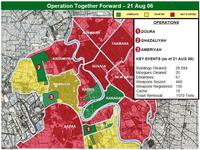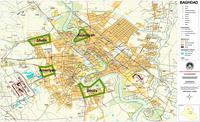The city of Baghdad, as well as Baghdad Province has become the epicenter of violence in Iraq. In a recent press briefing, Major General Bill Caldwell stated an estimated eighty percent of the violence in Iraq is occurring in Baghdad province.
The Iraqi government must establish some semblance of control over the city. Baghdad is the political center of Iraq, as well as the focal point for the foreign media, which plays a large roll in influencing international opinion on Iraq. The legitimacy of the Iraqi government is at stake, as is the potential for support of America at risk. Prime Minister Maliki’s reconciliation program, which has attracted interest from many Sunni insurgent groups, including two large factions, is also in jeopardy. The longer the sectarian violence goes uncontrolled, the greater the chance for the Sunni insurgent groups to give up on the program.
Baghdad has been difficult to secure for a variety of reasons. It is difficult to fight all-out counterinsurgency in a dense urban area such as Baghdad, a city with over six million residents. The potential for high civilian casualties along with the wholesale destruction of neighborhoods and civilian infrastructure would be politically untenable for both the Maliki government and the Bush administration.
To combat the insurgency, and sectarian and criminal violence in Baghdad, the Iraqi government and Coalition announced Operation Together Forward. USA Today provides a simplified breakdown of the operation. “The offensive is planned in stages and is designed to avoid an all-out attack. In the first phase, launched July 9, Iraqi Security Forces positioned checkpoints throughout the city. In the second phase, launched last week, Iraqi forces supported by U.S. troops began isolating and clearing parts of the city block by block. Iraqi Security Forces will remain to provide security once areas are cleared. When areas are stable, the government will bring economic assistance into blighted neighborhoods.” This strategy is essentially what the Marines call the “3 Block War.”
While many pundits have dismissed the operation as a failure as it did not secure the city within weeks of launch, the Coalition appears to have a longer time line to secure Baghdad measured in months, not weeks. As USA Today reports, the second phase of the operation began in the second week of August.
Operation Together Forward is focusing on four of the most violent neighborhoods of Baghdad: Doura, Mansour, Shula and Azamiyah. These are neighborhoods where the sectarian violence has been at its worst. Coalition forces have begun operations in Doura and Ameriya. In both cases, the neighborhoods were cordoned off, and each building was searched. “Kilometer after kilometer of barriers emplaced, building what some may call the semblance of a gated community, affording them greater security with ingress and egress routes established and manned by Iraqi Security Forces with coalition forces in support,” as the Multinational Forces – Iraq press release describes the operation in Doura.
A similar strategy of cordon, search, secure and rebuild was successfully executed in Tal Afar, and is currently being executed in the Sunni insurgent stronghold city of Ramadi. Tal Afar, with populations of 170,000 was secured in less than a month, while Ramadi, with a population of 400,000 is still up for grabs.
Securing Baghdad has its own unique problems other than the size and scale of the operation, as well as the number of forces needed. Baghdad is a multi-ethnic city, with large Shia and Sunni populations. Sadr’s militia, the Mahdi Army, is playing a large role in the sectarian violence, as is its sponsor Iran. Sadr’s militia has been repeatedly been the target of Iraqi and Coalition operations. And the Shiite dominated police force is not trusted by the Iraqi public. They have been accused of corruption and complicity in the sectarian violence. In some cases, the police stand by as Sadr’s militias rampage, and in other instances have actively participated in the murders. The Iraqi police must be reigned in if Baghdad is to be secured.
The strategy isolating neighborhoods from the insurgents and militias and restoring services has worked elsewhere in Iraq, and the question is can it succeed in a large city such as Baghdad. The insurgents, militias and criminals have the advantage of melting away during the major security operations, and infiltrating back in after the clearing operation ends as the entire city cannot be secured at once. This will be a challenge for the security forces left behind to police the neighborhoods, and it is vital the security force is vetted and supervised by Coalition teams and the Iraqi Army.
Time is working against the Iraqi government as they risk losing the gains made in forwarding reconciliation after the death of Abu Musab al-Zarqawi. Every effort should be made to push every last available security asset into Baghdad lest the hard work in the provinces of the past two years be negated by a failure to secure Baghdad.









